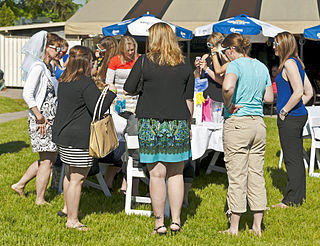 W
WThe 20th century saw multiple trends and changes in women's fitness culture.
 W
WA hen night or bachelorette party is a party held for a woman who is about to get married. While Beth Montemurro concludes that the bachelorette party is modelled after the centuries-old stag night in the US, which is itself historically a dinner given by the bridegroom to his friends shortly before his wedding, Sheila Young argues that its British counterpart evolved from a number of earlier pre-wedding traditions for women whose origins are obscure but which have been around for at least a century in factories and offices across the UK. Despite its reputation as "a sodden farewell to maiden days" or "an evening of debauchery", these events can simply be parties given in honor of the bride-to-be, in the style that is common to that social circle.
 W
WLying-in is the term given to the European forms of postpartum confinement, the traditional practice involving long bed rest before and after giving birth. The term and the practice it describes are old-fashioned or archaic, but it used to be considered an essential component of the postpartum period, even if there were no medical complications during childbirth.
 W
WNüshu is a syllabic script derived from Chinese characters that was used exclusively among women in Jiangyong County in Hunan province of southern China. Nüshu has been included in the Unicode Standard since June 2017.
 W
WPostpartum confinement refers to a traditional practice following childbirth. Those who follow these customs typically begin immediately after the birth, and the seclusion or special treatment lasts for a culturally variable length: typically for one month or 30 days, up to 40 days, two months or 100 days. This postnatal recuperation can include care practices in regards of "traditional health beliefs, taboos, rituals, and proscriptions." The practice used to be known as "lying-in", which, as the term suggests, centres around bed rest. In some cultures it may be connected to taboos concerning impurity after childbirth.
 W
WThe postpartum period begins immediately after childbirth as the mother's body, including hormone levels and uterus size, returns to a non-pregnant state. The terms puerperium, puerperal period, or immediate postpartum period are commonly used to refer to the first six weeks following childbirth. The World Health Organization (WHO) describes the postnatal period as the most critical and yet the most neglected phase in the lives of mothers and babies; most maternal and newborn deaths occur during this period. In scientific literature, the term is commonly abbreviated to Px, where x is a number; for example, "day P5" should be read as "the fifth day after birth". This is not to be confused with the medical nomenclature that uses G P to stand for number and outcomes of pregnancy.
 W
WModern yoga as exercise has often been taught by women to classes consisting mainly of women. This continued a tradition of gendered physical activity dating back to the early 20th century, with the Harmonic Gymnastics of Genevieve Stebbins in America and Mary Bagot Stack in Britain. One of the pioneers of modern yoga, Indra Devi, a pupil of Krishnamacharya, popularised yoga among American women using her celebrity Hollywood clients as a lever.